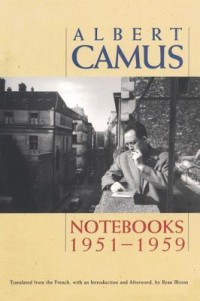
Notebooks 1951-1959
تأليف : Albert Camus
النوعية : الفكر والثقافة العامة
Notebooks 1951-1959 Albert Camus Withheld from publication in France for twenty-nine years after his death, and now in English for the first time, Camus's final journals give us our rawest and most intimate glimpse yet into one of the most important voices
of French letters and twentieth-century literature. The first two volumes of his Notebooks began as simple instruments of his work; this final volume, Withheld from publication in France for twenty-nine years after his death, and now in English for the first time, Camus's final journals give us our rawest and most intimate glimpse yet into one of the most important voices of French letters and twentieth-century literature. The first two volumes of his Notebooks began as simple instruments of his work; this final volume, recorded over the last nine years of his life, take on the characteristics of a more personal diary. Fearing that his memory was beginning to fail him, Camus noted here his reactions to the polemics stirred by The Rebel, his feelings about the Algerian War, his sojourns in Greece and Italy, thinly veiled observations on his wife and lovers, heartaches over his family, and anxiety over the Nobel Prize that he was awarded in 1957. As in the earlier Notebooks, we see here also the birth of some of Camus's greatest works: The Fall, Exile and the Kingdom, and his unfinished masterpiece, The First Man. His gorgeous travel descriptions, his political observations, and his philosophical musings are the most appealing features of these recorded thoughts. Notebooks 1951-1959 completes one of the most important set of literary "working papers" of the past century. Ryan Bloom's sensitive translation was shortlisted for the French-American Foundation and Florence Gould Foundation translation prize for nonfiction.
Notebooks 1951-1959 Albert Camus Withheld from publication in France for twenty-nine years after his death, and now in English for the first time, Camus's final journals give us our rawest and most intimate glimpse yet into one of the most important voices
of French letters and twentieth-century literature. The first two volumes of his Notebooks began as simple instruments of his work; this final volume, Withheld from publication in France for twenty-nine years after his death, and now in English for the first time, Camus's final journals give us our rawest and most intimate glimpse yet into one of the most important voices of French letters and twentieth-century literature. The first two volumes of his Notebooks began as simple instruments of his work; this final volume, recorded over the last nine years of his life, take on the characteristics of a more personal diary. Fearing that his memory was beginning to fail him, Camus noted here his reactions to the polemics stirred by The Rebel, his feelings about the Algerian War, his sojourns in Greece and Italy, thinly veiled observations on his wife and lovers, heartaches over his family, and anxiety over the Nobel Prize that he was awarded in 1957. As in the earlier Notebooks, we see here also the birth of some of Camus's greatest works: The Fall, Exile and the Kingdom, and his unfinished masterpiece, The First Man. His gorgeous travel descriptions, his political observations, and his philosophical musings are the most appealing features of these recorded thoughts. Notebooks 1951-1959 completes one of the most important set of literary "working papers" of the past century. Ryan Bloom's sensitive translation was shortlisted for the French-American Foundation and Florence Gould Foundation translation prize for nonfiction.



